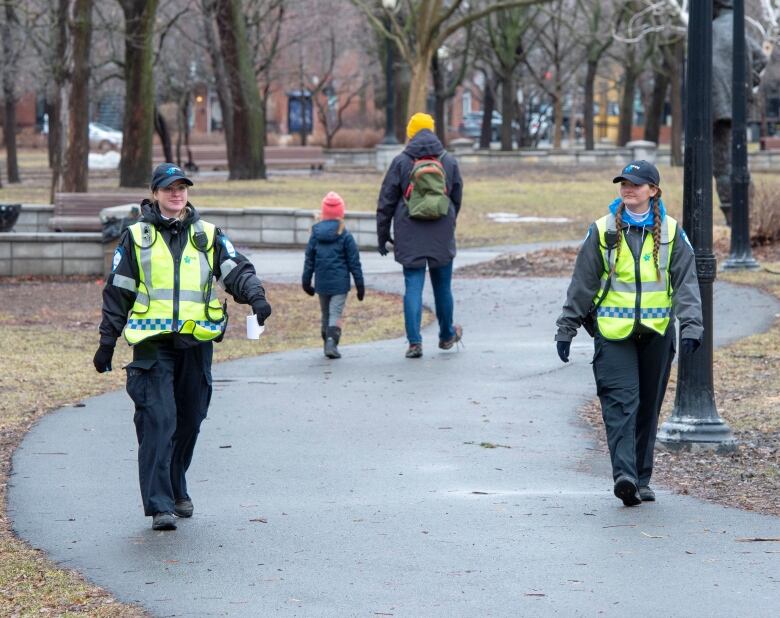OPINION | A COVID-19 smackdown: why rule breakers need to be punished
Let's meet the people who are the reason we cant have nice things

This column is an opinion fromLisa Lambert,a political scientist who teaches at the University of Lethbridge, and Melanee Thomas, who teaches political science at the University of Calgary.

We all know that one person who, despite all the instructions from public health and government officials, simply refuses to take COVID-19 seriously.
The person who insisted on working in close quarters with others, until being forced not to by government order. Or the one who refuses to even try to be two metres away from everyone else at the grocery store or on the river path.
They likely complain that all of this COVID-19 stuff is totally overblown.
"What is wrong with these people?!" you might ask.
We have an answer for you.
Or, rather, a woman named Elinor Ostrom does.
Ostrom is one of our academic heroes (quite like Alberta's chief medical officer of health, Dr. Deena Hinshaw).
Ostrom was a political scientist, who was also the first woman to win the Nobel Prize in economics back in 2009. She won for her brilliant research that can help explain why some folks today simply don't want to comply with COVID-19 rules and why we have to make them.
The reason: being selfish can be socially contagious.

Why asking isn't enough
Public officials have been clear about one thing for a couple months we need to act collectively to minimize the spread of COVID-19.
First, they asked that certain people self-isolate and that we all socially distance.
But because a few people just wouldn't listen, they had to institute mandatory edicts, punishable by harsh fines.
Most Albertans followed the "ask"instructions laid out by public health officials. So why do some folks need the penalty before they'll do the right thing?
Ostrom showed in her model of human behaviour that most people will act in the collective good, but a few will act in a totally self-interested way, screwing everyone else over. She also gave us numbers.
This is pretty intuitive the old "one bad apple"thing. But Ostrom also showed how the bad apple ruins the other apples.
Willing participants and rationalegoists
It would be a mistake to assume that the reason people don't follow the rules is because they don't know about them, or don't have enough information to follow them. That might be true sometimes, but we also need to account for the fact that some people don't follow the rules because they simply don't want to.
Let's apply Ostrom's research to COVID-19.
Economists used to think that, given a chance, everyone would always act in their own best interests, which could entail breaking rules to gain personal advantage. Ostrom showed that most people are willing to sacrifice for the collective good.
So most people will follow the rules set out by public health officials, even though that can sometimes be tough to do. These people are called "Willing Participants."
These folks will do what's asked of them by public health officials. They might grumble, but they understand there is a collective good. This is the majority of us; we estimate them as just shy of 65 per cent of people.

Then there are the "Rational Egoists."This is a considerable minority of people about 20 per cent.
Egoists are only interested in what's best for themselves.
Ostrom showed us that these egoists will only change their behaviour (say, in response to COVID-19) to avoid punishment. It's that fear of punishment that makes rule-following consistent with the egoists' perception of their self-interest.
Ostom's research also shows why egoists being seen to be acting in defiance of rules are so dangerous.
When egoists don't follow the rules, not only can their actions cause others to fall ill, but they can ruin the hard work of public health officials by, quite literally, showing willing participants the wrong way to behave.
Some willing participants, when asked if they would do something foolish just because they saw someone else doing it, will actually say yes. In this case, if those willing participants saw enough egoists ignoring social distancing, then some of them would also begin to ignore social distancing.
They're still "willing," but instead of following the rules, they're also now "willing" to break them.
If some rule breakers (egoists) turn into lots of rule breakers (egoists and willing participants), that's when it gets dangerous.
These two groups add up, by our estimates, to about 85 per cent of the population.
Altruists and punishers
Now, let's look at everybody else. Because they're divided pretty equally into two fascinating groups.
First, a small number are Altruists, who always do the right thing even though we can't explain why. Altruists are few and far between; nearly everyone else needs some kind of motivation to do the right thing.
The last group has, in our view, the most interesting motivation the Punishers.
Punishers are willing to suffer themselvesjust to stick it to the egoists. Their sense of "doing the right thing"means they are willing to personally punish the people who don't.
Some might call these folks justice warriors; some might be thinking, "Awesome! I would pay to punish the rule-breakers who are making all of this harder for the rest of us!"

While we can appreciate the sentiment, know that punishers can be both part of the solution, and they can make the collective problems we face much worse. Their actions can harm the social fabric.
Vindictiveness (or vigilantism) rarely inspires a great deal of goodwill toward one's neighbours, especially among the egoists, who are very concerned with their self-interest and acting out of spite.
We're left with a pretty challenging context to get everyone to follow the rules.
The way forward through stronger policy
Ostrom, were she still alive,would have several recommendations that could apply to our current situation.
We need to first make sure there is open and honest communication of the expectations when it comes to our behaviour. We need to know both the rules and the reasons for them.
This is why those daily newsers by politicians and chief medical officers are so important. They offer steady doses of information, and that information helps incentivize us to act for the social good.
The altruists are already onboard. The egoists must be made to conform with fines, penalties, or explicit rewards. Punishers must be able to actually inflict controlled punishment on the rule-violating egoists, which is why complaint lines need to be available.
And willing participants must see that the egoists are actually punished for breaking health rules. Say, collectively experiencing schadenfreude through a news reportof someone flouting the rules, getting caught and fined.
Our efforts to deal with the COVID-19 pandemic highlight how things that matter profoundly to us as individuals like, for instance, our health are really, at the end of the day, a collective responsibility.
This column is an opinion. For more information about our commentary section, please read thiseditor's blogandour FAQ.












_(720p).jpg)


 OFFICIAL HD MUSIC VIDEO.jpg)
.jpg)



























































































